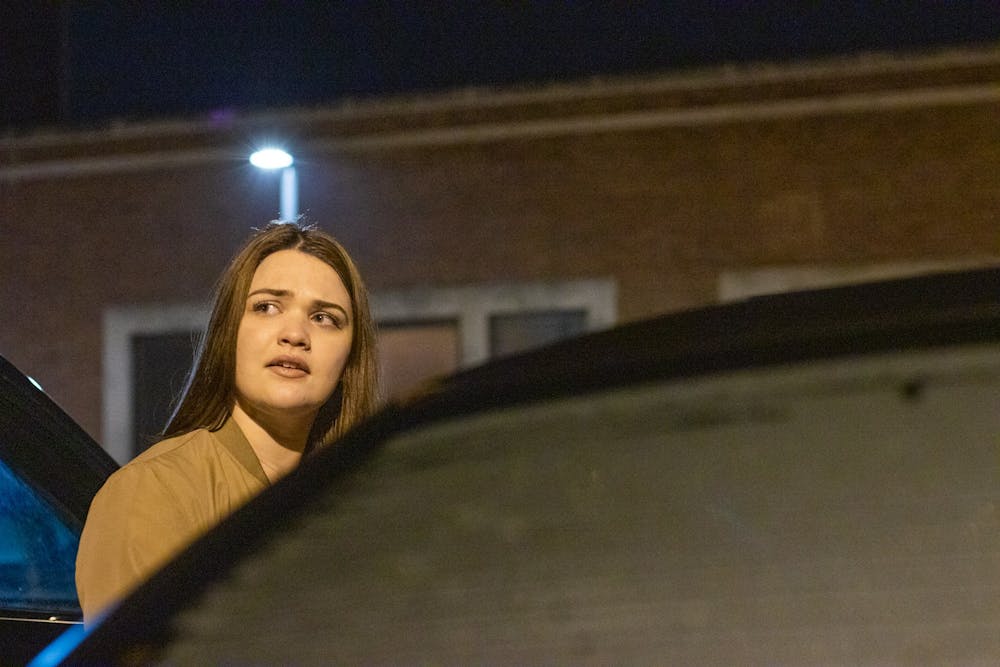
Rhyan Radabaugh is a junior communications major and writes “Personal Transgressions” for The Daily News. Her views do not necessarily agree with those of the newspaper.
On a Thursday night, my friend and I decided to join in on the festivities Be Here Now, a bar in the Village, had to offer. A local band was headlining and we were ready for a break from responsibilities for a night. The beginning of the night was fun as we swayed along with the loud indie music and shouted jokes back and forth.
I felt relaxed and happy — like I was living in a real-life college movie.
We decided that after the set, we would head back to my friend’s house and hang out before the night ended. As we strolled along, I noticed two men laughing with each other at one of the cars in the parking lot.
I didn’t think much of them until we walked past.
The two men instantly whipped their heads and whistled at us. I glanced back and caught them giving me a once-over with their eyes. One of the men got brave and said loud enough for the whole parking lot to hear:
“Woah baby, look at that ass!”
I wasn’t embarrassed or shocked, but I did feel my stomach drop ever so slightly. My friend, being an oblivious guy, didn’t think too much of it, so we kept walking casually to his house.
But it didn’t end there.
The two older men began following us through the parking lot. They continued asking what my name was. At that moment, my mind began to race with all the stories of women being kidnapped or assaulted in situations just like this. I began to panic and grabbed my friend’s hand while awkwardly jogging out of the parking lot all the way to our destination. I didn’t look back to see if they had stopped following us until I had gotten in the house safely and locked the door.
Although it was a fun night, I knew I wouldn’t remember anything about it but that terrifying moment.
The reality is women have to think about their safety in almost every aspect of their daily lives. Whether it’s making sure to park in a well-lit area when going to shop at Target or texting all of your female friends to let them know you got home unscathed, we make slight adjustments to our routine in order to avoid harassment or assault.
What happened to me in the parking lot is a form of sexual harassment we know as catcalling. Catcalling can be many things, from what happened to me to someone shouting out their car window at someone walking down the sidewalk. A 2018 national study discovered 81 percent of women have experienced sexual harassment within their lifetime, and 43 percent of men have experienced it, as well. Sexual harassment is so common that almost every woman in my life has had an encounter with sexually suggestive slurs or, in severe situations, assault.
Catcalling is a lot more than just a few derogatory words, though. It’s a way for harassers to test the waters — to see how far they can go before there are repercussions.
It may start with a guy whistling in your direction. When he notices no response from you, he may feel confident enough to shout out a “Hey beautiful.” When you ignore this advance, he may think he can get more risky — shouting what he loves about your body or your clothing.
In my case, the two men harassing me got brave enough to start following me out of the parking lot. I was fortunate enough to get out of the situation before it could escalate to anything physical.
Some women aren’t as lucky.
In my opinion, we have made progress as a society in terms of bringing light to the very dark subject of sexual harassment, but that doesn’t mean we cannot do better.
Catcalling is a result of a society that does not respect women as equals. I don’t think catcalling is going to go away any time soon, unfortunately, but we must break this system of objectification for women’s safety. Sexual harassment is not just a global issue — it effects our friends, our family members, our fellow students and us, and we cannot continue to allow catcalling to be brushed off as harmless when it has the possibility of leading to more terrifying situations, especially kidnapping or assault.
I want to be able to get into my car without having to quickly lock the doors and check my backseat. I want to be able to walk to my apartment from campus without holding a key like brass knuckles. I am tired of constantly being on guard.
My parking lot incident was not my first experience with sexual harassment, and unfortunately, I know it won’t be my last. At 17 years old, I was hired for my first job by a restaurant's 30-year-old kitchen manager solely because I was “hot.” On one of my first Saturday night shifts, I was the only girl working in the kitchen, along with my manager and two other older men. My manager came up behind me and pointed to my butt, letting me know I had a “cool zipper on my butt where I could hold my dollar tips.” They told me they loved when girls wore leggings in the kitchen because looking at a “good piece of ass on the job” helped make the hours go by quicker.
Realizing he could get in trouble for these comments, he pulled me toward the section of the kitchen where no cameras were present to tell me to not tell anyone what he said because we “were family, after all.”
I responded by telling him the comments made me feel uncomfortable — he laughed at me and said it was really no big deal. When I told my boyfriend at the time what had happened, he looked at me as though I was crazy for feeling uncomfortable and dirty.
At the time, I thought if no one else thought it was a big deal, maybe I should just let it go. So, I didn’t report the situation, and instead, I worked my shifts with zero complaints.
These harassers normalize our discomfort, and they gaslight our emotions. Because of this, we grow uncertain of reporting cases of sexual harassment because what if we’re just being dramatic? What if we are lying? What if we just want attention?
There is a bigger problem in our society if nearly every woman in our lives has had an experience where she felt unsafe or uncomfortable due to the comments and actions of others, most often men. Deciding not to talk about it only sweeps the issue under the rug. It doesn’t eliminate it. Education for both parties — for men to be educated on comments and actions that make an individual uncomfortable and for women to be educated on what to do if these events occur — is so important.
Going forward, both men and women alike must be open to continuing the conversation about what sexual harassment and catcalling are and ways to combat them. I’m not calling for every man to completely cut off women and go nowhere near them. Rather, I’m calling for a change in the way we approach this topic, starting with a mutual understanding of actions and words that may result in a woman’s discomfort.
After all, no one should have to worry about their safety when walking home after a concert at Be Here Now. My night was perfectly fine before my friend and I were forced to run for our lives. Our fun memories shouldn’t be tainted by an asshole’s decision to harass us and threaten our safety.
Contact Rhyan with comments at raradabaugh@bsu.edu.





